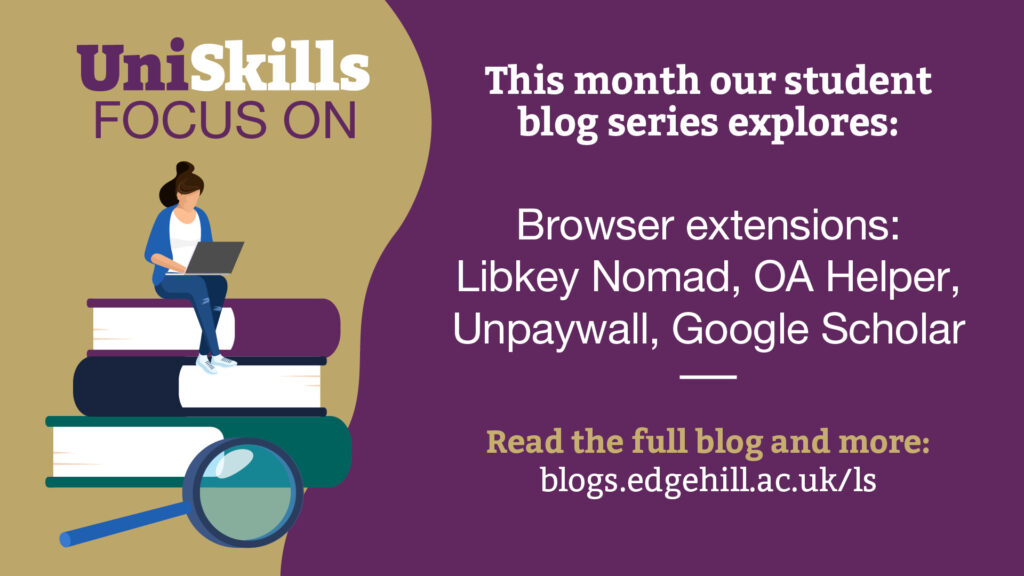Hello and welcome to the latest UniSkills Focus On… blogpost. This month we are going to explore browser extensions that can help you find academic journal articles, with particular focus on: Google Scholar, Libkey Nomad, Open Access Helper and Unpaywall.

What is a browser extension?
A browser extension is a small piece of software that customises and improves the experience of the searcher using a web browser. They can usually be downloaded from the Chrome Web Store, Microsoft Store and many extensions are also available for Firefox.
Google Scholar
Google Scholar is Google’s search engine for finding academic literature, which has advantages and disadvantages over more conventional academic search tools, such as Discover More or Academic Search Premier. If you want to learn more about Google Scholar, you can read our UniSkills Focus On: Google Scholar blog that gives you more information. Google has developed a useful browser extension called the Scholar Button, which can help you find a citation to, or the full text of, a journal article as you search the internet. Conveniently, you can read more about the Scholar Button on the Google Scholar blog. You can download the Scholar Button extension for Chrome and Firefox.
Libkey Nomad
Libkey Nomad is a browser extension that allows you to access the journal articles that Edge Hill subscribes to and when you download it you are prompted to choose your institution. As well as the links to our own subscriptions Libkey Nomad also has a large number of links to open access journal articles, that are free for anyone to use. That means if you need an article from a journal we don’t have Libkey Nomad may find an open access link for you. Libkey Nomad is available for a range of different browsers, including Chrome, Microsoft Edge, Firefox, Safari, Brave and Vivaldi.
Open Access Helper
When you find a journal article Open Access Helper will search for an open access link. If there isn’t an open access version of the article available Open Access Helper will search Edge Hill’s subscriptions and enable access to the article if it is in our collection. The browser extension is available for Chrome, Microsoft Edge, Firefox and Safari. There is also an app for iPhone and iPad.
Unpaywall
Unpaywall also gives access to open access journal articles, so if you have found a journal article but are unable to access it, Unpaywall will provide an open access link if one exists. In total Unpaywall contains links to over 50,000,000 articles from over 50,000 publishers and research archives. Unpaywall also has links to pre-prints on pre-print servers, such as arXiv. These are early versions of research articles before they have been peer reviewed and they allow you to access the latest, cutting-edge research. Unpaywall can be downloaded for Chrome and Firefox.
What are the advantages of using a browser extension?
Some of these browser extensions focus on open access links to journal articles and some can be linked up with Edge Hill’s subscriptions. Either way using a browser extension can make it easier to find academic journal articles for your assignments.
How to access browser extensions
There are lots of links to each browser extensions in this post that you can click on and there are other browser extensions of this type that you can download. You can also search the app store of the browser that you are using to download these and other extensions.
Further Help and Support
Remember, if you need any further help or support finding, accessing, or getting the most out of your resources head over to the UniSkills web pages. From here you can access lots more information, toolkits and video tutorials, book on a UniSkills Workshop and even book a one-to-one appointment.
We hope you found this blog post useful and interesting. Please joins us next time when we will be looking at Anatomy TV.